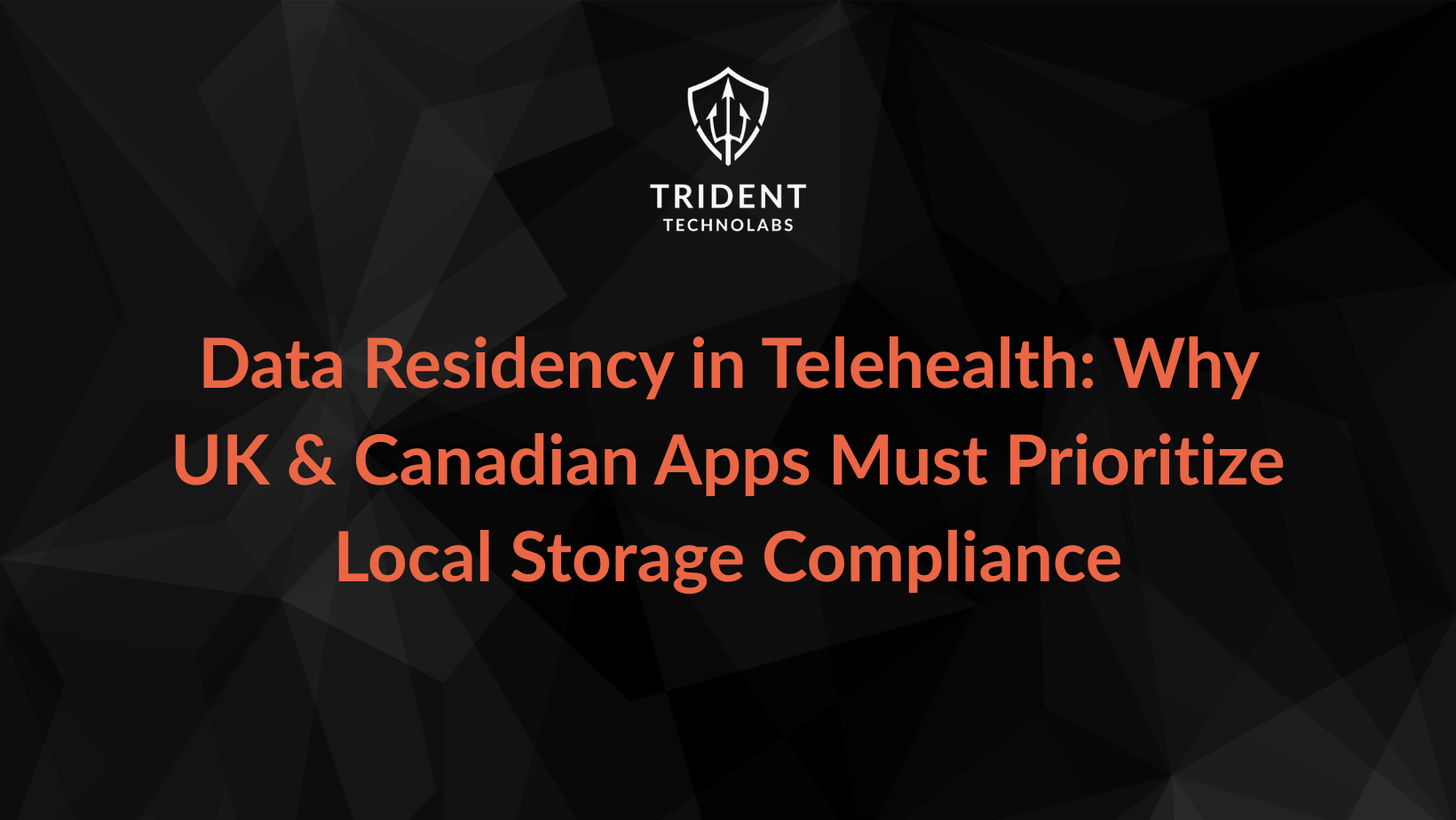Data Residency in Telehealth: Why UK & Canadian Apps Must Prioritize Local Storage Compliance

October 2, 2025
Data Residency in Telehealth: Why UK & Canadian Apps Must Prioritize Local Storage Compliance
The telehealth revolution is here. From video consultations to e-prescriptions, patients are embracing the convenience of digital healthcare. But behind the innovation lies a critical responsibility: data residency.
Unlike other types of applications, telehealth apps handle sensitive personal health information (PHI), which is strictly regulated in regions like the UK and Canada. Laws such as UK GDPR, PIPEDA, and PHIPA require healthcare providers and app developers to keep data secure and—most importantly—stored in approved local regions.
In this blog, we’ll break down what data residency in healthcare apps means, why it’s essential for telehealth app compliance in the UK and Canada, and how you can build apps that protect patients while staying fully compliant.
What is Data Residency in Healthcare?
Data residency refers to the geographic location where patient data is stored and processed. In healthcare, this means medical records, consultations, prescriptions, and test results.
Data residency vs. data sovereignty: Residency is where data lives, while sovereignty defines which laws govern it.
In healthcare, both matter because PHI (Personal Health Information) is among the most regulated forms of data worldwide.
Why it matters for telehealth apps:
Patients expect their medical information to stay private and within their country.
Non-compliance risks legal penalties, loss of licenses, and reputational damage.
Keywords: telehealth app compliance UK, PHIPA telehealth compliance, healthcare data storage laws
Data Residency Laws in the UK
The UK follows the UK GDPR and Data Protection Act 2018, both of which require telehealth app developers to ensure proper handling of patient data.
UK GDPR telehealth compliance: Health data is classified as special category data, demanding higher protection.
Post-Brexit rules: Patient data must be stored in UK-based or approved regions with equivalent protection.
Healthcare app developers must work with hosting providers that guarantee UK healthcare data residency.
Keywords: UK GDPR telehealth compliance, healthcare app data residency UK
Data Residency Laws in Canada
Canada’s data residency requirements are governed at both federal and provincial levels.
PIPEDA telehealth compliance: Nationwide, organizations must protect PHI and ensure patients provide meaningful consent.
PHIPA telehealth compliance (Ontario): Requires health information custodians to store and manage data responsibly, often preferring data to remain in Canada.
Many provinces recommend or mandate using cloud hosting for healthcare data in Canada, ensuring PHI doesn’t cross borders unnecessarily.
Keywords: PIPEDA telehealth compliance, PHIPA telehealth compliance, cloud hosting for healthcare data Canada
Challenges of Global Cloud Hosting
While global providers like AWS, Azure, and Google Cloud offer robust services, using data centers outside the UK or Canada can create compliance risks.
Legal conflicts: Foreign governments may claim access under their laws.
Security gaps: Storing PHI internationally can increase breach risks.
Reputation loss: Patients lose trust if their data leaves their home country.
Example: A Canadian telehealth app storing PHI in the US could face PHIPA non-compliance—even if encrypted—because of data sovereignty laws.
Keywords: telehealth data security best practices, secure healthcare software UK and Canada
Best Practices for Data Residency in Telehealth Apps
Building a compliant telehealth app in the UK and Canada requires strategic planning:
Use Region-Specific Data Centers
Choose UK-based servers for British patients.
Choose Canadian servers for Canadian patients.
Layer Security on Top of Residency
Apply end-to-end encryption and role-based access control (RBAC).
Pair with multi-factor authentication (MFA) for added protection.
Conduct Regular Audits
Implement audit trails for healthcare applications.
Schedule compliance checks for UK GDPR, PIPEDA, and PHIPA.
Choose the Right Cloud Partner
AWS, Azure, and Google Cloud all offer local healthcare-compliant hosting options.
Verify they meet HIPAA, GDPR, PIPEDA, and PHIPA certifications.
Keywords: audit trails for healthcare applications, secure healthcare software UK and Canada, telehealth app development for compliance
Final Thoughts
Data residency isn’t just a legal requirement—it’s a pillar of trust in telehealth. By ensuring your telehealth app complies with UK GDPR, PIPEDA, and PHIPA, you can confidently expand into the UK and Canadian markets.
At Trident Technolabs, we help healthcare organizations and startups build secure healthcare software for UK and Canada, ensuring compliance with all relevant laws. From cloud hosting for healthcare data to audit-ready telehealth app development, we’re here to help you navigate the complex landscape of data privacy.
👉 Ready to build a telehealth app that patients trust? Let’s make compliance your competitive edge.
Ready to Build a Smarter Clinic?
Whether you're a private practitioner or a hospital network, investing in a custom healthcare app can be a game-changer.
Contact Us Today